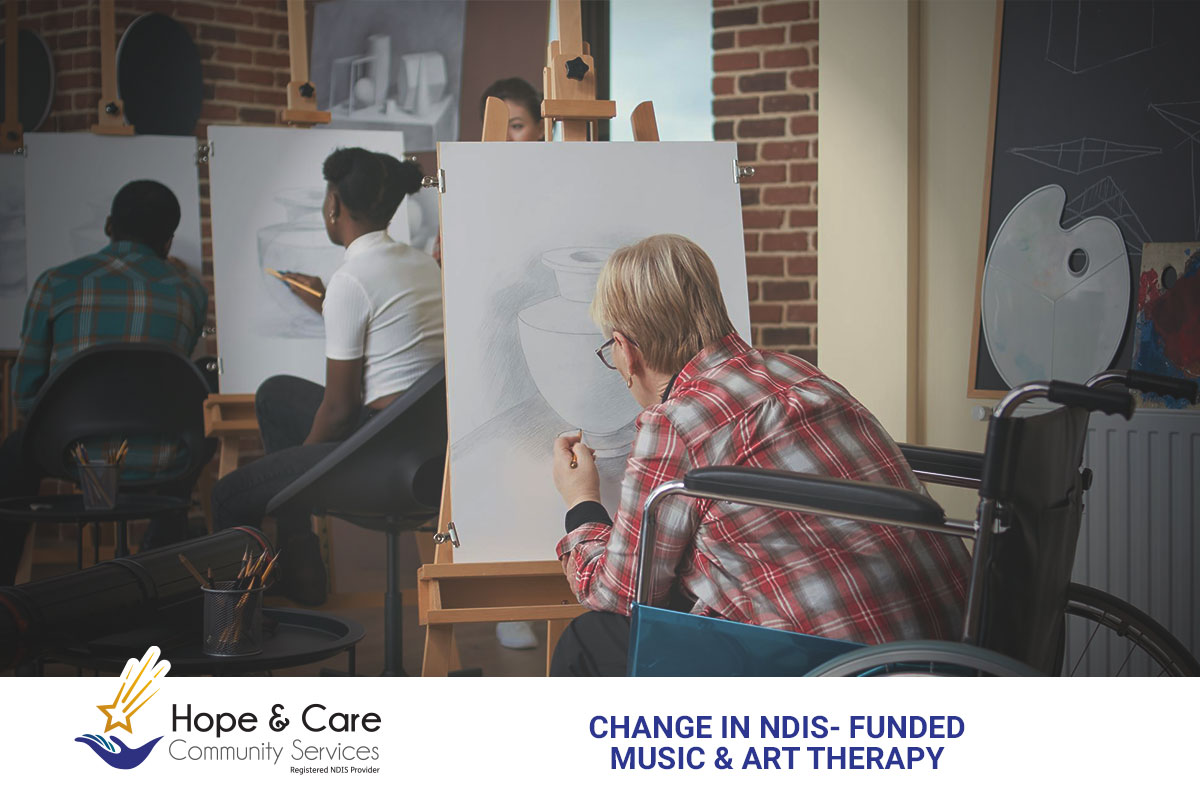
The National Disability Insurance Scheme (NDIS) has announced new changes to the funding structure for music and art therapy, set to take effect on 1 February 2025. These updates aim to align services with evidence-based practices while ensuring the program’s long-term sustainability. Although participants can still access these therapies, the revised guidelines introduce key changes that both NDIS participants and disability service providers need to understand.
In this article, we will break down these changes, explore why they are happening and discuss how they impact participants, providers and the future of music and art therapy under the NDIS.
Key Changes to Music and Art Therapy Funding
Starting February 2025, music and art therapy will remain accessible but with updated funding mechanisms. Here’s what’s changing:
- One-on-One Therapy Sessions
Participants can access individual music or art therapy sessions at a rate of $67.56 per hour. Funding for these sessions will now come from the community participationbudget, rather than the “therapeutic support” category. - Group Therapy Sessions
Group therapy sessions, involving at least four participants, will be funded at $193.99 per hour.
These updates aim to encourage community engagement and collaborative participation, aligning with the NDIS’s broader goals of inclusion, skill-building and social connection.
For now, the current funding arrangements will remain in place until the new guidelines come into effect.
Why Is the NDIS Implementing These Changes?
The NDIS is committed to ensuring that its funding supports evidence-based interventions that improve participants’ lives. Upon review, the NDIS determined that music and art therapy do not currently meet the required evidence standards to be classified as “therapy.”
Despite this reclassification, the value of these activities is not diminished. Instead, the changes aim to:
- Prioritise interventions with proven long-term benefits.
- Ensure sustainable funding for all participants.
- Provide clarity on what qualifies as “reasonable and necessary” support.
By reclassifying music and art therapy as community participation activities, the NDIS continues to make them accessible, ensuring these valuable supports remain available under a different funding category.
Impact of the Changes on Participants
The effect of these changes will depend on how music or art therapy is currently included in a participant’s NDIS plan. Here’s what you need to know:
- Participants with Specific Plan Inclusions
If your plan explicitly includes music or art therapy as a reasonable and necessary support, you can continue accessing these services at the higher funding rate. - Participants without Specific Inclusions
If music and art therapy are not explicitly listed in your plan, you will need to fund them through the community participation budget. This may reduce the scope of individual therapy sessions and could require adjustments to your plan.
To navigate these changes effectively, participants should work closely with their support coordinators or plan managers to allocate budgets and explore alternative options.
Impact of the Changes on Providers
Disability service providers specialising in music and art therapy will also need to adapt to the updated funding framework. Key considerations for providers include:
- Revising Fee Structures
Providers must adjust their fees to match the new funding rates. - Expanding Group Therapy Options
offering more group-based sessions can help providers align with the revised funding guidelines and meet the needs of participants. - Demonstrating Value
Providers should focus on demonstrating the effectiveness of their services to ensure they align with NDIS goals.
Additionally, providers should educate participants about the changes and offer flexible, creative solutions to maintain continuity of care
The Future of Music and Art Therapy Under the NDIS
Looking ahead, music and art therapy remain an important part of the NDIS support ecosystem. The NDIS has referred these therapies to the NDIS Evidence Advisory Committee for further review. This committee will assess the therapeutic value of music and art therapy and explore the possibility of reclassification based on emerging evidence.
In the meantime, ongoing research and advocacy will play a critical role in demonstrating the impact of creative therapies on participants’ quality of life. These efforts are crucial for shaping the future of music and art therapy within the NDIS framework.
How to Prepare for the Changes
Both participants and providers can take proactive steps to prepare for these updates.
For Participants
- Review Your NDIS Plan: Understand how the changes may affect your current therapies.
- Work with Your Support Coordinator: Collaborate to allocate your budget effectively under the new guidelines.
- Explore Group Activities: Consider group therapy sessions or other creative activities that align with your goals.
For Providers
- Communicate with Clients: Keep participants informed about how the changes impact your services.
- Develop Group-Based Programs: Create therapy options that meet the updated funding structure.
- Stay Informed: Monitor NDIS updates and guidelines to ensure compliance.
Conclusion
The upcoming changes to NDIS funding for music and art therapy represent a shift towards evidence-based practices and sustainable resource allocation. While these updates may present challenges, they also provide opportunities to innovate and enhance community participation.
By staying informed, adapting to the new framework and embracing collaboration, participants and providers can continue to benefit from the creative, social and developmental value of music and art therapy within the NDIS framework.
Want to learn more? Read other articles :
- Redefine Independence your own way – with HCCS
- Who’s Who: The Key Terms of Your NDIS Plan
- Foundational Supports: Building Blocks of NDIS Success
HCCS is a registered NDIS provider. Learn more about our services.
♥ We are available in Brisbane! – Our team is just a call away!
